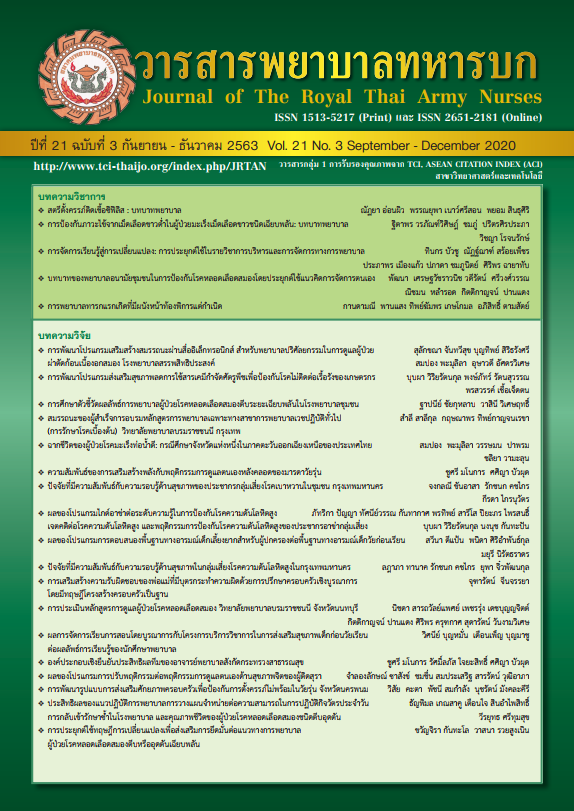The Evaluation of Caring Curriculum for Patients with Stroke in Boromarajonani College of Nursing, Changwat Nonthaburi
Keywords:
curriculum evaluation, caring, patients with strokeAbstract
This study was aimed to evaluate a caring curriculum for patients with stroke in Boromarajonani College of Nursing, Changwat Nonthaburi using the CIPP framework. The sample was 25 nurses who were trained in the caring curriculum, 25 commanders of nurses who were trained and 25 colleagues of nurses who were trained. Quantitative data was collected including, 1) The CIPP model questionnaire consisting of context, input, process, and the product collected from nurses who were trained in the caring curriculum, and 2) nursing competencies after training questionnaire collected from commanders and colleagues of trained nurses. Qualitative data was collected using a focus group interview with 8 nurses who were trained in a caring curriculum for patients with stroke. Quantitative data were analyzed by percentage, mean and standard deviation, and qualitative data was used by content analysis.
The results showed that the quantitative and qualitative findings were consistent. Overall, the results of evaluating a caring curriculum for patients with stroke in Boromarajonani College of Nursing, Changwat Nonthaburi was at a high level ( = 4.17 SD = 0.66). The evaluation of this program in each aspect found that: 1) this program had responded to the policy of health region, 2) the experts have been specialists and the instructional media were ready to use, 3) the process of this training program could guide nurses who were trained to solve of problems in real situations, and 4) nurses who were trained had increased the competencies in caring the patients with stroke and the competencies in searching data.
Downloads
References
Bureau of Non Communicable Disease. Annual report 2018 bureau of non communicable disease Ministry of public health. Bangkok: Aksorn graphic and design publishing limited partnership; 2019. (in Thai).
Hanchaiphiboolkul S, Poungvarin N, Nidhinandana S, Suwanwela NC, Puthkhao P, Towanabut S, et al. Prevalence of stroke and stroke risk factors in Thailand: Thai Epidemiologic Stroke (TES) Study. J Med Assoc Thai. 2011;94(4): 427-36. (in Thai).
Butsing N. Caring process for acute stroke patients. Journal of Thailand nursing and midwifery council. 2019;34(3):15-29. (in Thai).
Chaleoykitti S, Keskomon T. Health Counseling: Development of quality of care. Journal of The Police Nurse. 2015;7(1):254-62. (in Thai).
Stufflebeam DL, Shinkfield AJ. Evaluationtheory, models, andapplications. San Francisco: Jossey-Bass; 2007.
Buajeam S, Srisatidnarakul B. Nurses’ competencies in stroke unit. Journal of Nursing Science Chulalongkorn University. 2014;26(3):121-33. (in Thai).
Pibanwong P, Teeyapan W, Nadoon W, Apichutboonchock S, Phuarsa B, Chopsiang L, et al. The evaluation of training program of nursing specialty in family nursing practitioner: A study in boromarajonani college of nursing Sanpasithiprasong. 2019;63(3):175-84. (in Thai).
Onsri P, Wacharagate S, Kulpakdee R. An evaluation of the nursing specialty in nursing administration program at the royal Thai army nursing college. Journal of The Royal Thai Army Nurses. 2014;15(3):342-52. (in Thai).
Orkaeo D. Simulation based learning for nursing education. Journal of Boromarajonani College of Nursing, Bangkok. 2015;31(3):112-22. (in Thai).
Somphong P. An evaluation of training program of nursing specialty in nurse practitioner (Primary Health Care) faculty of Nursing, Srinakharinwirot university. [Thesis]. Bangkok: Srinakharinwirot University; 2012. (in Thai).
Wattradul D, Smuntavekin S. The effectiveness evaluation of stroke special nursing training program: the application of Kirkpatrick’s model approach. Thai Journal of CardioThoracic Nursing. 2018;29(2):111-26. (in Thai).
Wangsachantanon T, Wanapong S, Kooptanon K, Niropakorn U. Evaluation of the bachelor degree of nursing science program (Revised Curriculum 2004) Srinakharinwirot university. Thai Pharmaceutical and Health Science Journal. 2010; 5(4):344-9. (in Thai).
Downloads
Published
How to Cite
Issue
Section
License
บทความหรือข้อคิดเห็นใดใดที่ปรากฏในวารสารพยาบาลทหารบกเป็นวรรณกรรมของผู้เขียน ซึ่งบรรณาธิการหรือสมาคมพยาบาลทหารบก ไม่จำเป็นต้องเห็นด้วย
บทความที่ได้รับการตีพิมพ์เป็นลิขสิทธิ์ของวารสารพยาบาลทหารบก
The ideas and opinions expressed in the Journal of The Royal Thai Army Nurses are those of the authors and not necessarily those
of the editor or Royal Thai Army Nurses Association.






